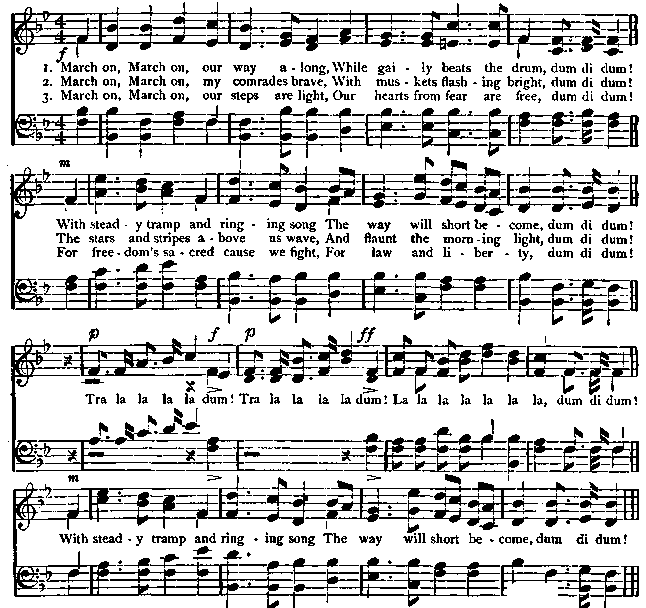Franklin Square Song Collection - online songbook
200 favorite songs and Hymns for Schools, Homes Lyrics & Sheet Music
| Share page | Visit Us On FB |
|
132 |
FRANKLIN-SQUARE SONG COLLECTION. |
|||
|
An Old Singer.—It is in his translation of the Gospel of St. John, completed A. D. 735, that the venerable Bede appears to us as the first writer of English vernacular prose. The story of the writing of this first prose book in the English language, as related by Cuth-bert, one of Bede's pupils, is full of pathetic interest: As the season of Easter was drawing near, the zealous scholar and teacher began to feel symptoms of approaching death. But he continued faithfully the performance of his daily duties, and suffered nothing to distract his attention from his accustomed labor, or to abate his usual cheerfulness and good humor Now and then, while in the midst of his labors, with his pupils all |
around him, he would sing some verses of an English song—"rude rhymes that told how before the need-fare, Death's stern ' must go,' none can enough bethink him what is to be his doom for good or ill. We never read without weeping," writes Cuthbert. And so the anxious days passed, and Ascension week drew near, and both master and pupils toiled with increased zeal to finish, if possible, the work in hand—the translation of St. John's Gospel. " Learn with what speed you may," said the dying man; " for I know not how long I may last. I do not want my scholars to read a lie or to work to no purpose when I am gone." The last day came, and his pupils stood around him. "Thei> |
|||
|
MARCHING SONG. |
From the German. |
|||
 |
||||
|
|
||||
|
|
||||
|
is still one chapter wanting," said the scribe, seeing the master's increased weakness. " It is easily done," said Bede; " take thy pen and write quickly." They wrote until eventide drew on. Then the scribe spoke again: "There is yet but one sentence to be written, dear master." "Write it quickly," was the response of the dying man. "It is finished now," at length said the youth. "Thou hast well said," faintly replied the master," all is finished now." The sorrowing pupils supported him tenderly in their arms while he chanted the solemn "Glory to God," and with the last words of the song his breathing ceased. Such is the story of the beginning of our literature. The humble transla- |
tion of the Gospel of St. John, completed under circumstances of such painful anxiety, and amid the gathering shadows of death, was the vanguard, so to speak, of that long procession of noble works which, for a thousand years, has been contributing to the development and glory of the English nation.—Baldwin. Music is too often looked upon as nothing but a mere passing enjoyment—something only for the moment, to be heard and perhaps little regarded—as simply a concord of sounds agreeable to the ear: but true art occupies a much higher sphere than this; and to be able to truly appreciate and enjoy it, we must know something of the laws by which it is governed. |
|||